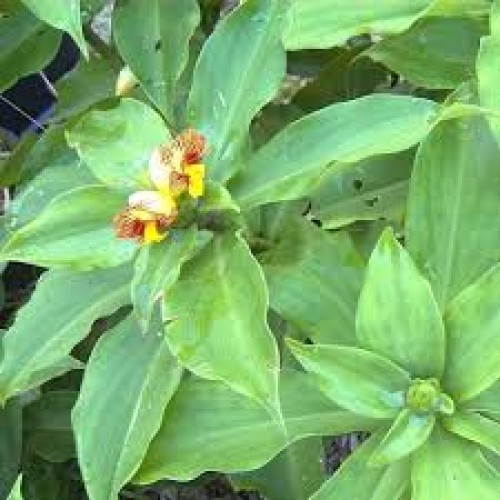off
-
Sold
-

-

out
Insulin Plant: Nature, Care & Advantages
The **Insulin Plant** (*Costus igneus*), also known as **Costus** or **Chamaecostus** in scientific terms, is a medicinal plant known for its potential health benefits, particularly in managing **diabetes**. It is native to tropical regions and is widely used in herbal medicine. The plant is often referred to as the “**Insulin Plant**” due to its reputed ability to help regulate blood sugar levels. It is a perennial plant that has gained popularity for its easy cultivation and the medicinal properties it offers.
Nature of the Insulin Plant
The Insulin plant is a tropical herbaceous plant that grows up to 1-1.5 meters in height. It has glossy green leaves and attractive yellow flowers that bloom during the warmer months. The plant is non-invasive and thrives in humid climates. It prefers partial sunlight but can also grow in shaded areas. The plant produces tuberous roots and has a bushy appearance, making it a suitable ornamental addition to gardens as well.
Care for the Insulin Plant
- Climate: The Insulin plant thrives in warm, tropical climates. It requires moderate temperatures, typically between 20°C to 30°C, and is sensitive to frost. It can be grown indoors in cooler regions where the temperature is controlled.
- Soil: This plant prefers well-drained, loamy soil that is rich in organic matter. It is essential to ensure proper drainage to prevent waterlogging. Slightly acidic to neutral soil is ideal for the plant’s growth.
- Watering: Insulin plants prefer consistently moist soil but do not tolerate waterlogging. Water the plant regularly, especially during the growing season, but ensure that the soil does not become soggy. Allow the top layer of the soil to dry before watering again.
- Sunlight: The Insulin plant thrives in partial sunlight or indirect light. Too much direct sunlight can lead to leaf burn. A shaded spot or a location with filtered sunlight is ideal for optimal growth.
- Fertilizing: While the Insulin plant is not very demanding, it can benefit from occasional feeding with organic fertilizer. A balanced, water-soluble fertilizer can be applied once a month during the growing season to promote healthy growth.
- Pruning: Pruning can help maintain the shape and encourage bushier growth. Trim dead or yellowing leaves regularly to maintain the plant’s appearance and health.
- Propagation: The plant can be propagated through cuttings or division. When propagating by cuttings, take a healthy, mature stem, allow it to root in water or directly plant it in well-drained soil.
Advantages of the Insulin Plant
- Regulation of Blood Sugar: The primary benefit of the Insulin plant is its reputed ability to help lower blood sugar levels. The leaves of the plant are believed to have compounds that mimic the effect of insulin in the body, making it beneficial for managing diabetes. Consuming fresh leaves regularly is said to help regulate glucose levels.
- Rich in Antioxidants: The Insulin plant is rich in antioxidants, which help fight oxidative stress and free radical damage in the body. These antioxidants may play a role in reducing the risk of chronic diseases, including heart disease and cancer.
- Anti-inflammatory Properties: The Insulin plant has anti-inflammatory effects, which can help alleviate conditions such as arthritis, joint pain, and inflammation-related discomfort. It is used in traditional medicine to treat inflammatory diseases.
- Supports Weight Loss: Some studies suggest that the Insulin plant may help in weight management by regulating blood sugar levels and improving metabolic function. Lower blood sugar levels can contribute to reduced fat accumulation in the body.
- Digestive Health: The plant is also beneficial for digestion. It is believed to aid in improving gut health, reducing bloating, and promoting regular bowel movements. It can help relieve constipation and other digestive issues.
- Improves Skin Health: Due to its anti-inflammatory and antioxidant properties, the Insulin plant may have benefits for the skin. It is believed to promote a healthy complexion and can be used to treat skin irritations, rashes, and minor wounds.
- Adaptogenic Properties: The Insulin plant is often considered an adaptogen, which means it helps the body manage stress more effectively. Regular consumption may improve the body’s ability to cope with stress, anxiety, and fatigue.
Conclusion
The **Insulin plant** is a remarkable plant with various health benefits, particularly for those managing diabetes. It is easy to grow and care for, making it a popular choice for home gardens. Whether used as an herbal remedy or as an ornamental plant, the Insulin plant offers numerous advantages that contribute to overall health and well-being. By understanding how to care for this plant and its benefits, you can harness its potential to support a healthier lifestyle.

